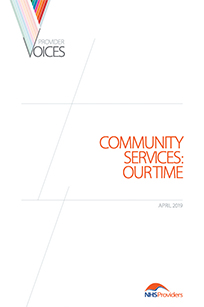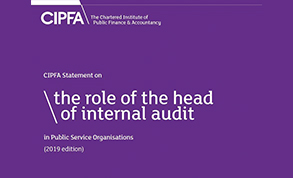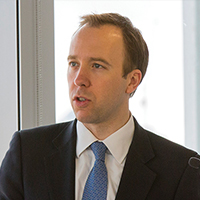News review – May 2019
It will come as no surprise to NHS finance professionals that the service’s productivity is growing, with a relentless focus on value for money over the past decade. And, according to a recent independent study, NHS productivity grew two-and-a-half times as fast as in the general UK economy over the last 12 years. The University of York’s Centre for Health Economics found that the health service provided 16.5% more care in 2016/17 than it did in 2004/05. Productivity growth in the wider economy stood at 6.7% over the same period.
Reducing inappropriate delays in transfers of care is one way of increasing efficiency and productivity, and these have been falling recently. A further boost may be provided by a new digital portal that allows health and social care staff to see how many vacancies there are in local care homes, potentially saving them hours of time telephoning around to check availability. In 2018 about a quarter of a million hospital bed days in England were taken up by people who were medically fit to be discharged but who could not be placed in an appropriate care home. The NHS and local auhorities reduced the number of lost bed days by 20% last year and the new capacity tracker aims to reduce unnecessary delays leaving hospital still further.
and productivity, and these have been falling recently. A further boost may be provided by a new digital portal that allows health and social care staff to see how many vacancies there are in local care homes, potentially saving them hours of time telephoning around to check availability. In 2018 about a quarter of a million hospital bed days in England were taken up by people who were medically fit to be discharged but who could not be placed in an appropriate care home. The NHS and local auhorities reduced the number of lost bed days by 20% last year and the new capacity tracker aims to reduce unnecessary delays leaving hospital still further.
The latest figures from NHS England show that delayed transfers in February were 9.3% lower than 12 months earlier. However, more delays were attributable to the NHS (62.5% compared with 60.2% in February 2018). The figures also showed that A&E attendances were 4.1% higher in 2018/19 than the previous financial year. In March this year, 86.6% of patients were admitted, transferred or discharged within four hours – an increase of 2.4 percentage points since February. In elective care, at the end of February 87% of patients had been waiting fewer than 18 weeks. Although the 92% target was missed, this represents a slight increase since January (86.7%).
A report from NHS Digital showed that out-of-area placements in mental health services cost more than £10m in January. The report presented findings from the out-of-area placements collection for England, and said the average daily cost was £550 and the upper quartile daily cost was £636. According to the report, 20,790 out-of-area placement days were recorded over the month of January. The government has set a target of eliminating inappropriate out-of-area placements in mental health by 2020/21. However, the report found that 645 of the 675 active out-of-area placements at the end of the month were inappropriate. The British Medical Association said the government was not on track to end the practice by 2021.
 A new briefing from NHS Providers – Community services: our time – calls for primary care networks (PCNs) to be implemented in a collaborative way taking account of what is already in place and working well. Relationships between community services and primary care will become more important as PCNs are rolled out across the country – one of the key proposals of the NHS long-term plan. The publication is based on interviews with 10 leaders from across the health and care sector. It added that with PCNs due to recruit 20,000 new community staff, care will be needed to ensure community providers and expanded primary care teams do not end up competing for staff and destabilising some provision.
A new briefing from NHS Providers – Community services: our time – calls for primary care networks (PCNs) to be implemented in a collaborative way taking account of what is already in place and working well. Relationships between community services and primary care will become more important as PCNs are rolled out across the country – one of the key proposals of the NHS long-term plan. The publication is based on interviews with 10 leaders from across the health and care sector. It added that with PCNs due to recruit 20,000 new community staff, care will be needed to ensure community providers and expanded primary care teams do not end up competing for staff and destabilising some provision.
PCNs will be the building blocks of integrated care systems (ICSs), the advent of which could lead to further clinical commissioning group mergers – the NHS long-term plan says that, generally, there will be one CCG per ICS. The policy and procedures NHS England and CCGs must follow if the latter want to make changes to their constitution or to dissolve two or more CCGs that wish to merge are set out in a new publication from NHS England and NHS Improvement, updated from a 2016 version.
NHS England and NHS Improvement has announced a new nationally set reference price for adalimumab, which came into effect on 1 April and is distinct from the interim arrangement that has been available to date. The drug is the single medicine on which hospitals spend the most (more than £400m a year) and is used to treat conditions such as rheumatoid arthritis and inflammatory bowel disease. The reference price – alerted in a letter from the two bodies’ deputy chief executive, Matthew Swindells – applies to all patients being treated with adalimumab and is intended to support the uptake of the best-value biologics for each regional group. It also ensures that patients are able to access a citrate-free product where clinically required, and that providers are fully reimbursed for their costs.
NHSX, the new NHS technology and data organisation, will seek to use tech to improve cancer and mental health patient experience, the Department of Health and Social Care said. NHSX will work with NHS England’s cancer and mental health policy teams to make it easier for patients to access services through smartphones; give clinicians access to patients’ medical information; and make it easier to collect and use health data for research. If successful, the programme will be rolled out across the NHS. The new organisation will be launched in July and will be mandated to ensure all computer systems can talk to each other.
The Welsh government has approved three-year plans submitted by seven NHS organisations, health and social services minister Vaughan Gething said. In a written statement, the minister said he had approved seven ‘balanced and achievable’ plans. He singled out one of the seven – Cardiff and Vale University Health Board – for praise. The board was placed in targeted escalation in July 2016, but had worked ‘constructively and maturely’ with government officials to address delivery and financial issues. Intervention was de-escalated in January this year. Three organisations were unable to submit board-approved three-year plans and remain in escalation – Abertawe Bro Morgannwg, Hywel Dda and Betsi Cadwaladr university health boards.
 Finally, a call to recognise internal auditors in the NHS and across the public sector. According to CIPFA, auditors should be given more recognition, support and encouragement. Its new statement, The role of the head of internal audit, sets out five principles outlining the key expectations of heads of internal audit and the conditions that allow them to thrive. The principles are aligned with the UK Public Sector Internal Audit Standards.
Finally, a call to recognise internal auditors in the NHS and across the public sector. According to CIPFA, auditors should be given more recognition, support and encouragement. Its new statement, The role of the head of internal audit, sets out five principles outlining the key expectations of heads of internal audit and the conditions that allow them to thrive. The principles are aligned with the UK Public Sector Internal Audit Standards.
From the HFMA
Former NHS finance director Paul Miller takes inspiration from Oscar Wilde as he outlines efforts to bring value to the fore in healthcare. A blog for the HFMA website looks at the work of NHS Future-Focused Finance and the HFMA Healthcare Costing for Value Institute to deliver a best possible value decision framework to help put value into practice. The approach uses 12 standard templates/tools to guide people through a structured process, ending with a three-dimensional scoring system that supports the decision-making process.
 There is a new paradigm for NHS leaders, including finance directors, according to Ewan King (pictured), the Social Care Institute for Excellence chief operating officer. He recently presented research at an HFMA masterclass on system leadership in the NHS and found finance leaders open to the new reality of sharing power, working across organisational boundaries and focusing on population outcomes. In a blog, he says new skills will be needed, but he is confident finance staff will rise to the challenge.
There is a new paradigm for NHS leaders, including finance directors, according to Ewan King (pictured), the Social Care Institute for Excellence chief operating officer. He recently presented research at an HFMA masterclass on system leadership in the NHS and found finance leaders open to the new reality of sharing power, working across organisational boundaries and focusing on population outcomes. In a blog, he says new skills will be needed, but he is confident finance staff will rise to the challenge.
In the 12th instalment of his blog series on life as chief financial officer of Bermuda Hospitals Board, Bill Shields outlines the continued focus on change, with payment moving from fee-for-service to a global sum or capped revenue budget for most services. This is reminiscent of the way the NHS worked in the past and he promises to keep readers appraised of any learning points for both the UK and Bermuda.
Month in quotes
‘This is a huge tribute to the work of NHS staff, and the intrinsic efficiency of this country’s health service. It represents further welcome proof that taxpayers’ investment in our health services is money well spent.’
NHS England chief executive Simon Stevens says health service productivity grew at more than double that achieved in the wider UK economy
‘Primary care and community services have a vital role to play working together to help change the way people are supported, especially those who are frail and vulnerable. The question of whether community services will receive the national focus they deserve has never been more relevant.’
NHS Providers chief executive Chris Hopson calls for greater attention on community and primary care services‘Heads of internal audit across the whole public sector are working in increasingly high-pressure environments, contending with restricted resources and growing levels of financial risk. While many organisations are already doing a great job in this space, it’s crucial that heads of internal audit and their teams are given the tools they need to provide quality assurance to their organisations.’
CIPFA chief executive Rob Whiteman seeks to boost the profile of internal audit
‘NHSX is one of the most exciting things happening in the UK. It’s cutting edge, it’s mission driven and it’s about harnessing the best. This is just the beginning of the tech revolution, building on our NHS long-term plan to create leading health and care services – for us all.’
Health and social care secretary Matt Hancock on new digital body NHSXRelated content
We are excited to bring you a fun packed Eastern Branch Conference in 2025 over three days.
This event is for those that will benefit from an overview of costing in the NHS or those new to costing and will cover why we cost and the processes.